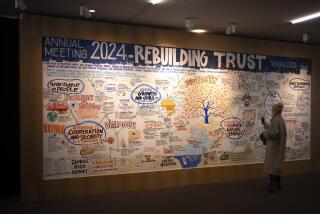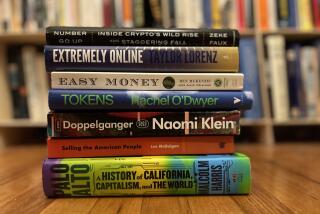‘MacroWikinomics’: Can the Internet help rescue the world?
- Share via
The Internet is either destroying civilization as we know it or giving us the tools to build a much better version. Or maybe it’s doing both.
The rhetorical battle lines have been drawn in a series of books this year. On one side are apocalyptic voices such as Nicholas Carr and Jaron Lanier, who lament that we are all becoming slaves to the machine.
On the other are optimists, such as Clay Shirky, who believe that in the networked age, everyone with an Internet connection has something to contribute to the greater good.
There is no mistaking where Don Tapscott and Anthony Williams stand. “Wikinomics,” their 2006 book, predicted that the same type of mass, Internet-enabled collaboration that lies behind such phenomena as Wikipedia and the Linux open-source operating system would remake much of the business world.
If that sounds ambitious, this time they really swing for the fences with their new book, “MacroWikinomics: Rebooting Business and the World,” published by Portfolio. Adding a “macro” to the title gives them the excuse to suck just about anything they want into their overwrought analysis.
Healthcare, education, green energy, transportation, the media, government: There is nothing that can’t be fixed once enough like-minded people connect and share their ideas over the Web.
In this vision, all institutions — up to and including the nation-state — are on their last legs, waiting to be remade by the attention of concerned citizens.
“Many promising solutions to issues ranging from the current healthcare crisis to climate change already exist at the fringes of the established institutions and in the collaborative spaces of the Web,” the authors say.
The idealism — their first chapter is called “Rebooting the World” — says something about how thinking about the Internet has evolved in the decade and a half since it first burst into the public consciousness.
The early euphoria, that it would produce a “new economy” to replace the old boom-and-bust cycles of the Industrial Age, evaporated in the dot-com collapse. It is now back with a vengeance.
To be sure, most Internet users have found that as consumers, patients or engaged citizens they are better informed, often because they have been able to draw on the experience of others online. Many have felt the sense of power that comes from adding their own voice to the cacophony.
The difficulty with books such as “MacroWikinomics” is that they take interesting phenomena like these, then apply a heavy dose of messianic fervor to produce an absolutist view of the future. All institutions are inept or corrupt: Only bottom-up activism can solve the world’s big problems.
Take the chapter on how a dose of self-help over the Internet will save the world financial system. Tapscott and Williams lay out three ideas that are currently the subject of online experimentation.
One involves publishing the sort of complex financial models that lay behind the debt crisis, in the hope that transparency would enable outsiders to spot weaknesses.
Another lets the masses vote on which among a group of promising start-ups should receive venture capital, while a third involves peer-to-peer systems in which individuals lend directly to one another, without the mediation of banks.
These may all be interesting experiments, but they hardly amount to a program for rebuilding the financial system.
Such claims hint at the thinking behind this book. This is a Jeffersonian vision, where the yeoman farmer has become the broadband-connected householder. It is the triumph of individualism, with a very American flavor.
It would be nice to believe that Tapscott and Williams have history on their side, and that projects such as Linux foretell a world where anyone with an Internet connection and an hour to kill will give generously of their cognitive surplus.
For readers looking for ideas and inspiration about how to use the Web to co-opt others, the many examples in “MacroWikinomics” make it a useful addition to the literature. But as a prognosis for the future, it feels like wishful thinking.
Book reviewer Richard Waters is a San Francisco-based editor for the Financial Times, in which this review first appeared.






